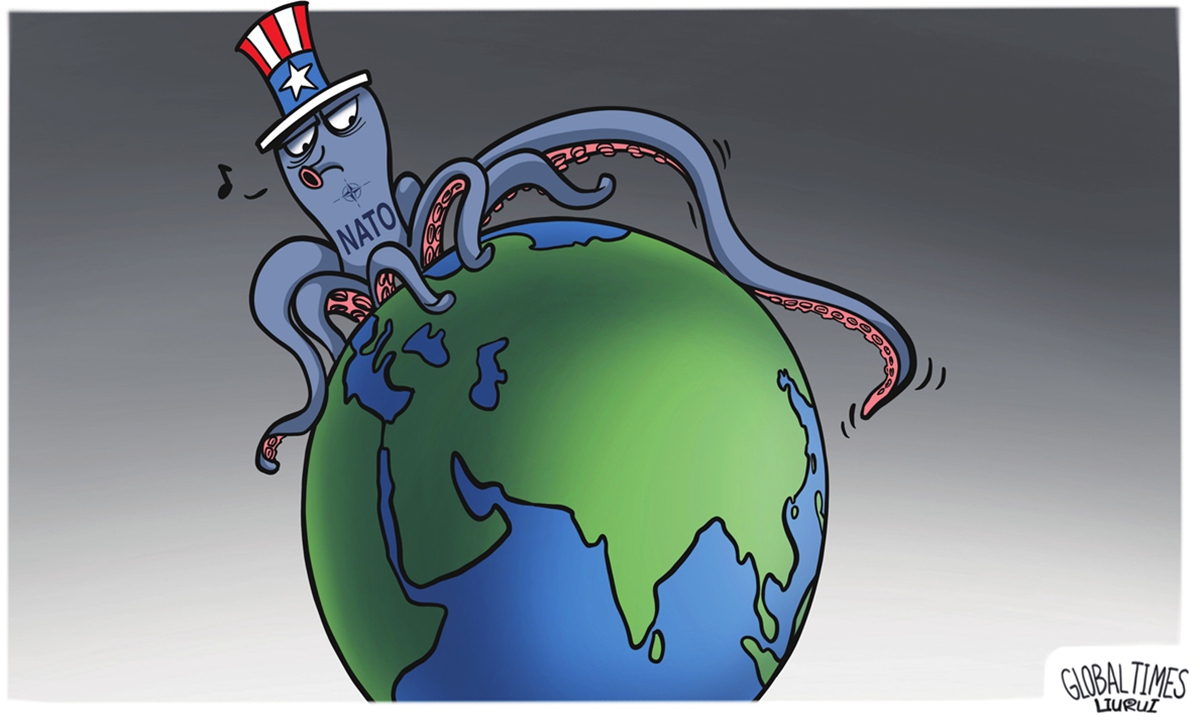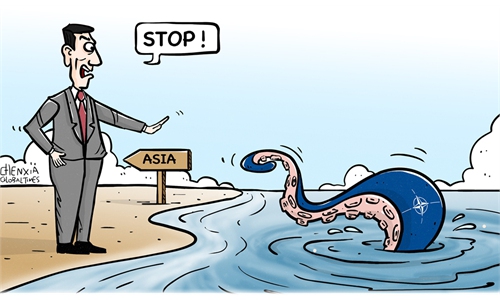
Illutration: Liu Rui/GT
Turkey has dropped its opposition to Sweden's admittance to NATO after receiving assurances that Stockholm will "actively support efforts to reinvigorate" Ankara's application to join the European Union. It is as shabby a piece of cynical geopolitical horsetrading as you are likely to see for a long time. It is the promise of membership of one monolithic bloc to be achieved by the possibility of membership of another.The deal, which followed a behind-closed-doors meeting between NATO Secretary General Jens Stoltenberg, Turkey's President Recep Erdogan, and Sweden's Prime Minister Ulf Kristersson on the eve of NATO's annual summit, held this year in Vilnius, Lithuania, was hailed as a victory for all involved.
Crucially, it also contains assurances that Sweden, previously styling itself a sanctuary for political refugees, will now crack down on activists and dissidents to whom it previously offered safe haven to. This includes people associated with the Marxist-Leninists of the Kurdistan Workers' Party, or PKK, which Turkey regards as a terrorist organization. Previously, this had caused tension between the two nations but Sweden - so keen to shelter beneath NATO's armed wing - has changed its constitution and laws to more effectively accede to Turkey's wishes. It seems that one person's freedom fighter can become another's terrorist when it serves the West's interests.
Erdogan's commitment to Sweden was obviously welcomed by US President Joe Biden, not least because America sits at the top of the NATO pecking order. His language was significant as he pledged to stand ready "to work with President Erdogan and Turkey on enhancing defense and deterrence in the Euro-Atlantic area." Note "Euro-Atlantic." The original NATO is dead, passing away at the end of the Cold War. Since then it has resurrected itself as something with a wider remit than protecting its members from an attack by the former Soviet Union. It has gradually crept eastward, absorbing ex-Warsaw Pact countries - despite repeated assurances to Russia that it would not - until it now has started to take in countries relinquishing centuries of jealously guarded neutrality. In Europe, Ukraine is one of the few remaining to be absorbed, and talk among generals and politicians is no longer about if, but when, that will happen.
If NATO admits Ukraine to membership before the war is over, or if the alliance puts boots on the ground during the conflict with Russia, it would herald and consummate its domination of the Western theater and expose its tentative pivot to Asia for exactly what it is: sinister mission toward global dominance.
The organization brings with it not just military power, but also a worldview which believes that its systems, apparatus, and processes are the only legitimate ones, supporting its so-called rules-based liberal order which recognizes only itself as the acceptable - indeed, the only permissible - way of doing things: its own particular form of political and economic hegemony. Why else would a strategic military aspiration (Sweden's NATO membership) be so blithely shackled to a purely economic one (Turkey's EU membership)? President Erdogan summed it up perfectly as he left for Vilnius: "First, clear the way for Turkey in the European Union, then we will clear the way for Sweden as we did for Finland." It is becoming harder to separate NATO's military ethos from the US' and the EU's economic one. That is why NATO regards any different way of doing things, especially as represented by China, as such a threat.
That is also why the leaders of the 31 NATO states who are gathering in Lithuania will be joined by Yoon Suk-yeol, president of South Korea. He will deliver one of the opening speeches. Although the shadow of Ukraine will cast itself over much of the proceedings, Yoon's presence is indicative of NATO's growing interest in Asia. So too is the presence of Japanese Prime Minister Fumio Kishida, who is expected to call for closer ties between Tokyo and NATO.
Stoltenberg has made it clear he sees Beijing as a systemic challenge to the alliance, with Taiwan as a possible flashpoint. What is "happening in Europe today could happen in Asia tomorrow," he has declared. NATO has come a long way from the days it sought to operate only around the North Atlantic. Now, it sees itself as the cheerleader for its own hegemony - that is, American hegemony as there is no doubting the US is the dominant member who calls the shots.
The author is a journalist and lecturer living in Britain. opinion@globaltimes.com.cn

